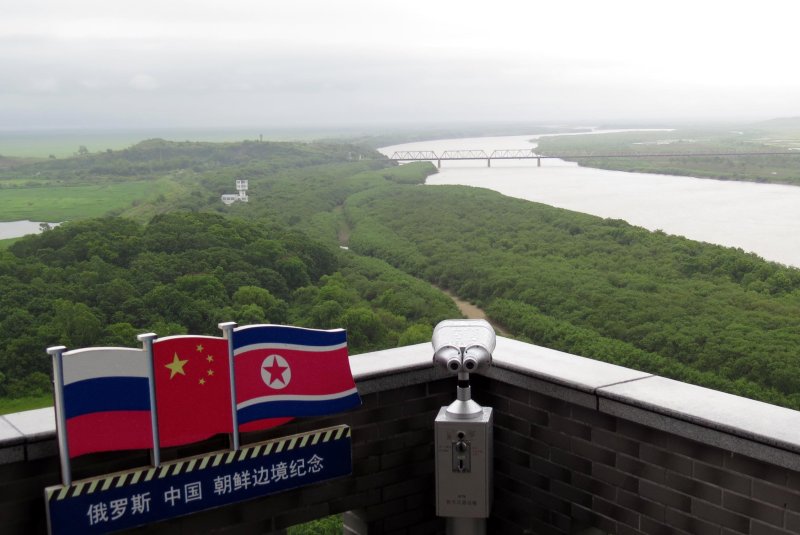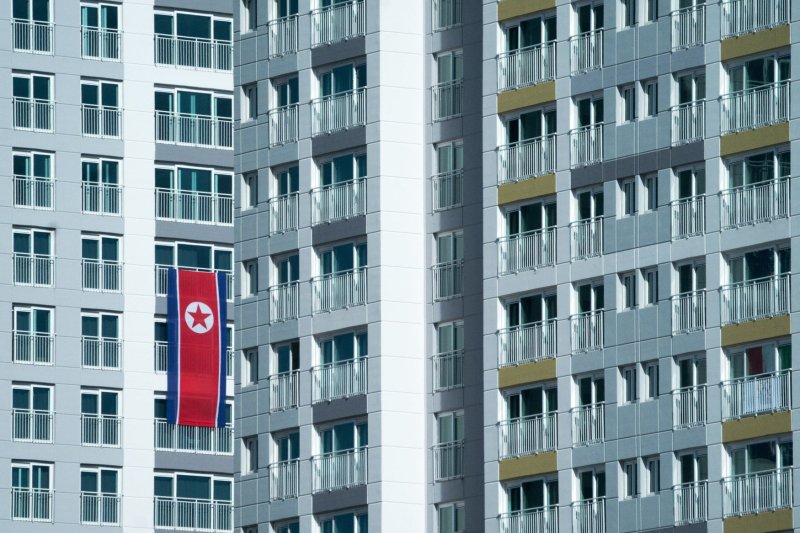China, North Korea, Russia test out new freight rail

China, Russia and North Korea are cooperating on a freight rail line, according to a Chinese state-owned enterprise in Jilin Province this week. File Photo by Yonhap
July 2 (UPI) -- A freight rail line connecting North Korea, China and Russia has begun trial runs, according to a Chinese state-owned enterprise.
Jilin Province Northeast Asia Maritime Silk Road International Shipping Co. said on its proprietary website a train carrying six containers left from the city of Hunchun last Friday, arriving an hour later at a train station in the Russian Far East, South Korean news agency Yonhap reported Thursday.
The train then left Russia via a branch line in Khasan, Russia, arriving at the last stop, the Tumen River Station in North Korea on Monday afternoon, the Chinese agency said.
"This trial run was carried out with the active support and under the guidance of the Moscow state headquarters of the ministry of railways of the Russian Federation and the Korean State Railway" of the Ministry of Railways of North Korea, the provincial agency said.
July 2 (UPI) -- A freight rail line connecting North Korea, China and Russia has begun trial runs, according to a Chinese state-owned enterprise.
Jilin Province Northeast Asia Maritime Silk Road International Shipping Co. said on its proprietary website a train carrying six containers left from the city of Hunchun last Friday, arriving an hour later at a train station in the Russian Far East, South Korean news agency Yonhap reported Thursday.
The train then left Russia via a branch line in Khasan, Russia, arriving at the last stop, the Tumen River Station in North Korea on Monday afternoon, the Chinese agency said.
"This trial run was carried out with the active support and under the guidance of the Moscow state headquarters of the ministry of railways of the Russian Federation and the Korean State Railway" of the Ministry of Railways of North Korea, the provincial agency said.
The Chinese state-owned firm said the trial run showed improvements in transportation efficiency and met the objective of lowering logistics costs.
Jilin Shipping said the plan is to "further increase the potential of the route," as well as to "increase the types of cargo, and two-way transportation." The Chinese agency added China and North Korea are to "study the possibility of operating refrigerator cars" across the border within the scope of "policies and regulations."
China is North Korea's No. 1 trading partner, but cross-border exchange declined dramatically following the outbreak of COVID-19 in China in January.
North Korea could be preparing to fight drought, an increasing problem that exacerbates food shortages in the country.
Korean Workers' Party newspaper Rodong Sinmun said Thursday workers must do their utmost "to prevent damage from floods, wind and rain." North Korea's agriculture ministry also said a successful crop depends on the rainy season, according to North Korean state media.
Report: More than 60 countries violated sanctions with North Korea last year

A report from a U.S. think tank released Wednesday found that 62 countries violated international sanctions on North Korea over the past year. File Photo by Kevin Dietsch/UPI | License Photo'
SEOUL, July 2 (UPI) -- Sixty-two countries violated United Nations Security Council sanctions against North Korea over a one-year period, according to a report from a Washington, D.C.-based think tank
The Institute for Science and International Security report, released Wednesday, cites over 250 alleged violations from February 2019 to February 2020 based on data compiled by the United Nations Panel of Experts on North Korea.
The 62 countries in violation represented an increase of six countries compared to the previous year, according to the institute.
China topped the chart with more than 60 alleged violations and Hong Kong followed with over 20. Sierra Leone, Russia and Indonesia each had a total of 10 or more alleged violations and several countries, including India, Italy, Singapore and Vietnam, had more than five violations each.
South Korea made the list for violating sanctions that included entities selling luxury goods to North Korea, including a pair of armored Mercedes Benzes, and importing coal from the North.
The United States was also listed as a country through which payments related to vessels and shipping were routed.
The report noted, however, that South Korea and the United States were among the countries "reported to have taken remedying actions since becoming aware of the violations and to have prosecuted or extradited responsible companies and individuals."
In May, the U.S. Justice Department unsealed an indictment charging 28 North Koreans and five Chinese citizens with operating a money-laundering scheme worth billions of dollars to help fund the North's nuclear weapons program.
The United States also issued guidance in May for the maritime industry and energy sector to help avoid practices that countries such as North Korea use to evade sanctions, including secretive ship-to-ship transfers done at sea and the disabling of automatic identification systems on vessels.
The Institute for Science and International Security report found that nine countries were involved in arms sales and other military-related cooperation with North Korea, including China, Egypt, Iran and Syria.
The United States was also listed as a country through which payments related to vessels and shipping were routed.
The report noted, however, that South Korea and the United States were among the countries "reported to have taken remedying actions since becoming aware of the violations and to have prosecuted or extradited responsible companies and individuals."
In May, the U.S. Justice Department unsealed an indictment charging 28 North Koreans and five Chinese citizens with operating a money-laundering scheme worth billions of dollars to help fund the North's nuclear weapons program.
The United States also issued guidance in May for the maritime industry and energy sector to help avoid practices that countries such as North Korea use to evade sanctions, including secretive ship-to-ship transfers done at sea and the disabling of automatic identification systems on vessels.
The Institute for Science and International Security report found that nine countries were involved in arms sales and other military-related cooperation with North Korea, including China, Egypt, Iran and Syria.
"The states in this category warrant special international scrutiny, as they provide a platform for the DPRK to sell arms and also make sensitive procurements for its own WMD and missile programs," the report said.
The Democratic People's Republic of Korea is the official name of North Korea.
The U.N. Security Council toughened sanctions against North Korea in 2017 after Pyongyang tested long-range ballistic missiles and detonated a nuclear weapon at its Punggye-ri test site.
Sanctions have remained a sticking point in nuclear negotiations between North Korea and the United States, which have been stalled since a summit between U.S. President Donald Trump and North Korean leader Kim Jong Un in February 2018 failed to produce an agreement.
North Korea had been seeking the lifting of some sanctions in exchange for taking steps to wind down its nuclear program.
South Korean President Moon Jae-in has pushed for another Trump-Kim summit before the U.S. presidential election in November, according to reports Wednesday.


























